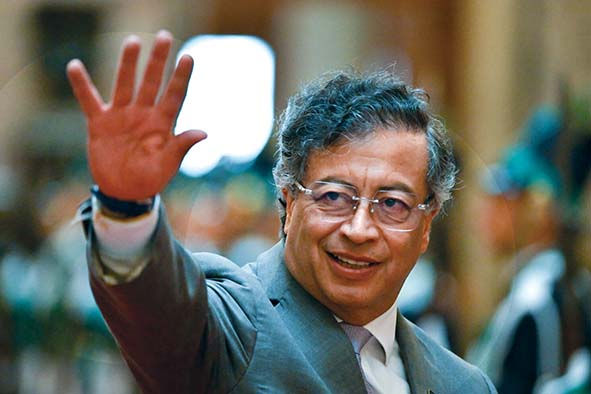Colombia at Crossroads: The Politics and Economics of a Regional Power
- Sumant Vidwans

- Aug 17
- 3 min read
President Petro’s final year could determine whether Colombia consolidates its gains, tackles persistent challenges, and reinforces its role as a regional power.

Colombia, South America’s second most populous and fourth largest country, borders Venezuela, Brazil, Peru, Ecuador, and Panama, with coasts on both the Pacific and Caribbean, and is home to about 52 million people. Famed for coffee, emeralds, oil, and coal, Colombia is among the world’s most biodiverse nations, spanning the Amazon rainforest and Andean landscapes. As South America’s third-largest economy, it shapes regional politics, Amazon Basin governance, and security cooperation.
This country is at a decisive moment right now as President Gustavo Petro’s administration is entering its final year. Poverty figures are showing mixed progress, a long-standing border dispute with Peru has flared up, the energy sector is facing significant setbacks, and a former president has been placed under house arrest on corruption charges. Together, these developments underline the country’s current political and economic crossroads.
Political Landscape in Transition
President Gustavo Petro, Colombia’s first leftist leader, came to power with ambitious goals: advancing a “paz total” (total peace) process to end armed conflicts, implementing social reforms to reduce inequality, and steering the country toward greener economic policies. His government has reduced poverty and resumed talks with guerrilla groups, but faces stalled reforms, political fragmentation, and ongoing rural security challenges.
Petro’s approval has fallen from over 50% to around 30%, reflecting public dissatisfaction. His tense relationship with Vice President Francia Marquez, a fellow environmental activist and presidential contender, stems from unresolved differences on environmental policies. Colombia’s one-term limit bars Petro from running again.
In a separate development, former President Alvaro Uribe was sentenced to 12 years’ house arrest for corruption. Once one of Colombia’s most influential figures, his case underscores broader issues of political accountability, though it is unrelated to Petro’s government.
Border Dispute with Peru
A revived dispute with Peru over Santa Rosa Island in the Amazon near Leticia poses a key foreign policy challenge for Colombia. Peru’s recent unilateral designation of the island as a new district sparked protests, seen by Colombia as a sovereignty breach and a threat to Amazon access. Beyond territory, the island is vital for river transport, trade, and ecological preservation. The Petro government seeks a diplomatic resolution, possibly via the Amazon Cooperation Treaty Organisation, highlighting how dormant border disputes can strain Latin American relations.
Energy Sector Setbacks and Policy Shifts
Colombia’s offshore oil and gas sector, once a major revenue hope, faces uncertainty. Despite heavy multinational investment over the past decade, recent drilling has disappointed, and Petro’s regulatory tightening, including a halt on new contracts, has dampened investor interest.
The impact is already visible: Petrobras’ promising Sirius project has been delayed until at least 2030, and several international firms are scaling back their operations. Supporters of Petro’s policies argue that transitioning away from fossil fuels is essential for environmental and climate goals, while critics warn that reduced hydrocarbon revenues could limit funding for social programmes and infrastructure.
Social Policy Outcomes and Poverty Trends
However, Colombia has also recorded some progress when it comes to economic and social policy. Official figures show that the national poverty rate fell from 34.6% in 2023 to 31.8% in 2024, which is the lowest since 2012. Extreme poverty has also seen a modest decline. However, the gains have not been uniform: income has declined for the poorest 20% of the population, and rural poverty remains stubbornly high. Critics also question the accuracy of official statistics.
The causes of falling poverty are debated, with some attributing it to higher remittances and rising sectoral wages rather than government action. Still, the figures will shape political narratives ahead of the 2026 elections, influencing perceptions of Petro’s legacy and his party’s prospects.
Regional and Global Significance
Colombia’s importance extends beyond its borders. It has been a close ally of the United States in security cooperation and anti-narcotics efforts, while also playing a key role in regional environmental governance through the Amazon Cooperation Treaty. In recent years, China has sought to expand its economic footprint in Colombia, mirroring broader trends in Latin America and adding a layer of strategic competition to the country’s foreign relations.
Domestically driven decisions on energy, social policy, and governance will inevitably affect Colombia’s ability to project influence regionally. In trade, climate negotiations, and security dialogues, its position as a relatively stable democracy in a turbulent region gives it both opportunities and responsibilities.
President Petro’s final year in office will be critical in determining whether the country can consolidate its gains and address persistent challenges. While Colombia may not dominate global headlines, its choices in the coming months could influence regional stability and certain global commodity markets. For a nation often overlooked in international discussions, this turning point offers a moment to shape its trajectory and reaffirm its role as a regional power.
(The writer is a foreign affairs expert. Views personal.)




Comments